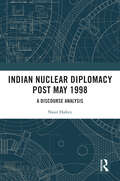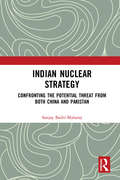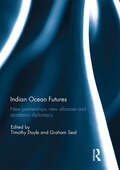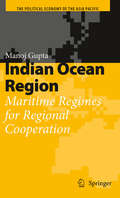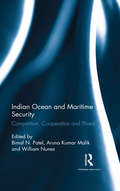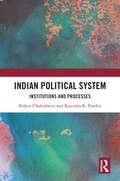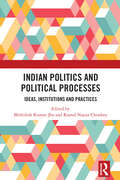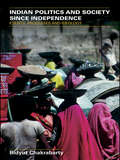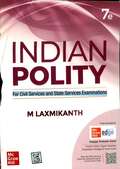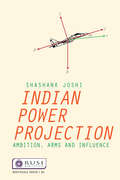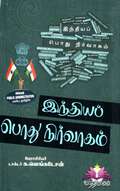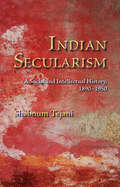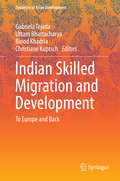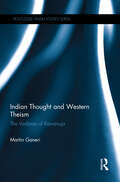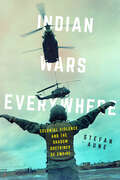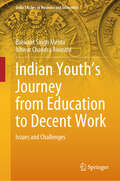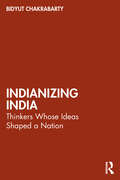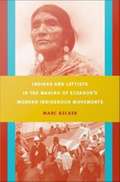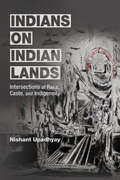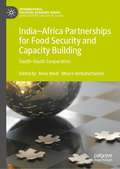- Table View
- List View
Indian Nuclear Diplomacy Post May 1998: A Discourse Analysis
by Nasir HafeezThis book explores Indian nuclear diplomacy in post May 1998 and deconstructs the discourse presented in public and private sphere. It shows how India discursively constructed its self image as the promoter of peace and stability not only in the region but in the entire world and employed concerns raised by international community in the prevailing environment to present a discourse that looked sensible and even attractive. The discursive constructions in Indian nuclear diplomacy discourse offer a fresh insight into Indian strategic culture and will draw attention of many scholars and policy makers not only in South Asia but across the world.Scholars and researchers working in the field of discourse analysis, international relations, strategic studies and nuclear non-proliferation will find this book of great interest.
Indian Nuclear Strategy: Confronting the Potential Threat from both China and Pakistan
by Sanjay Badri-MaharajThis book examines India’s nuclear strategy as it confronts the potential threat from both China and Pakistan. The potential threats - traditional as well as non-traditional CBRN threats - will be examined as will India’s approach to dealing with them. India’s nuclear arsenal, its dual purpose civil-military space program and its nascent BMD capability will be explored with a view to informing the reader as to the steps taken by India to confront its nuclear challenges. Please note: Taylor & Francis does not sell or distribute the Hardback in India, Pakistan, Nepal, Bhutan, Bangladesh and Sri Lanka
Indian Ocean Futures: New Partnerships, New Alliances, and Academic Diplomacy
by Graham Seal Timothy DoyleIndian Ocean studies, which once lagged behind studies of the Atlantic and the Pacific, is an important emerging academic field which has come into its own. In the next fifty years, the Indian Ocean Region will become very significant as a result of enormous demographic changes. What was the Ocean of the South is rapidly becoming the Ocean of the Centre, the Ocean of the Future. Curtin University, Western Australia, has a long and distinguished history of engagement with the Indian Ocean region and with Indian Ocean Studies, and its Australia-Asia-Pacific Institute of Curtin University continues to maintain a focus on the Indian Ocean -past, present and future. This book examines a number of themes emerging from its 2014 Conference entitled "Indian Ocean Futures", which attracted some of the best Indian Ocean region scholars. The conference connected humanities, social sciences and scientific disciplines; this book collects some of the preeminent works focused on geo-strategic, cultural, environmental security and human security themes. The book is also an important contribution to the building of academic diplomacy in the region – that is to say, it contributes to region-building by creating epistemic communities and networks between government, the private sector, and academia throughout the region. Through the pursuit of academic diplomacy, academics are capable of pursuing research goals which enhance governmental, business, and civil society objectives of the day. This book was previously published as a special issue of the Journal of the Indian Ocean Region.
Indian Ocean Region
by Manoj GuptaThe Indian Ocean region is arguably one of the world's least understood, yet its importance in geopolitics and international relations is greater than ever before. This book explores the concepts of regime theory, regional orders and ocean governance to critically assess the effectiveness of maritime regimes, something that not been attempted before for the Indian Ocean Region. This study employs the theoretical framework of international regimes in the context of ocean governance by developing a new model, which is used to test the regimes' effectiveness. This book addresses the analytical gap in our understanding about the strategic importance of the Indian Ocean as a region in contemporary world geopolitics and international relations. Case studies display the groundwork for regional cooperation in the maritime realm laid by Indian Ocean countries, and the effectiveness of current political leadership is addressed. There is considerable value in looking at the Indian Ocean as a region for future analysis of maritime regimes, and this book proposes that international maritime regimes can expand regional cooperation in the Indian Ocean to create a new geopolitical region. The interdisciplinary approach presented draws on historical analysis, international maritime law, political science, international relations and the literature on regime theory and will be of interest to academics in those fields as well as policy-makers concerned with maritime issues.
Indian Ocean and Maritime Security: Competition, Cooperation and Threat
by Bimal N. Patel Aruna Kumar Malik William NunesThis book provides a synoptic view of the Indian Ocean and maritime security in its contested waters. Using a historical approach, it reveals vital links to events in the present day. The volume: Highlights the competition between major Asian powers to control the ‘String of Pearls’ — a reference to the Chinese attempts at controlling the Indian Ocean periphery. Shows that cooperation amongst the major powers of the region could abate the threat of the potential of conflict becoming global and inviting external intervention. Discusses India’s Look-East policy and the deepening relation between India and the Association of Southeast Asian Nations (ASEAN). Argues for the need of Indian Ocean states and particularly the South Asian Association for Regional Cooperation (SAARC) members of the Indian Ocean Rim Association (IORA) to look afresh at their political and security issues and common interests. Suggests measures for evolving a robust mechanism of maintaining the Indian Ocean as a sustainable zone of commerce, energy, security and peace rather than threat. A major contribution on a critical area in Asian geopolitics, this volume will be useful to scholars and researchers of international relations, politics, defence studies and maritime security studies, along with strategic affairs experts and think tanks.
Indian Political System: Institutions and Processes
by Bidyut Chakrabarty Rajendra K. PandeyThis volume examines the distinct structural characteristics of Indian politics and unearths significant sociopolitical and economic processes which are critical to the political articulation of governance in the country. It reflects on the foundational values of Indian polity, the emergence of the nation post-colonialism, the structural fluidity of federalism in India, and the changing nature of the planning process in the country. The book also studies the electoral processes, social movements, party system, local and state governance. Apart from analyzing corruption and public grievance systems, the volume also probes into significant issues in Indian politics. This book will be useful to the students, researchers and faculty working in the field of political science, public administration, political sociology, political economy and post-colonial contemporary Indian politics in particular. It will also be an invaluable and interesting reading for those interested in South Asian studies.
Indian Politics and Political Processes: Ideas, Institutions and Practices
by Mithilesh Kumar Jha Kamal Nayan ChoubeyIndian Politics and Political Processes explores the key ideas, foundations, continuities, major shifts and challenges to the state and democracy in modern India. The book presents an in-depth analysis of recent issues and challenges confronting the Indian state and politics. Presenting a comprehensive account of the major trajectories of Indian politics, this book introduces the readers to the existing literature and enables them to think critically about major issues and institutions of politics and democracy. The chapters engage critically with the historical antecedents, major debates, and recent developments. The book also elaborately deals with issues such as populism, religious movements, minority rights, health, and the environment, which are often ignored or side-lined in the available literature on Indian politics and political processes. The book will be useful to the students, teachers and researchers pursuing courses in political science, South Asian Studies, and international/global politics and economics. It will also be an informative read for those interested in contemporary South Asian politics.
Indian Politics and Society since Independence: Events, Processes and Ideology
by Bidyut ChakrabartyFocusing on politics and society in India, this book explores new areas enmeshed in the complex social, economic and political processes in the country. Linking the structural characteristics with the broader sociological context, the book emphasizes the strong influence of sociological issues on politics, such as social milieu shaping and the articulation of the political in day-to-day events. Political events are connected with the ever-changing social, economic and political processes in order to provide an analytical framework to explain ‘peculiarities’ of Indian politics. Bidyut Chakrabarty argues that three major ideological influences of colonialism, nationalism and democracy have provided the foundational values of Indian politics. Structured thematically and chronologically, this work is a useful resource for students of political science, sociology and South Asian studies.
Indian Polity - Competitive Exam: For Civil Services and State Services Examinations - 7th Edition
by M LaxmikanthThe "INDIAN POLITY 7th Edition" by M LAXMIKANTH is a comprehensive guide tailored for aspirants of India's Civil Services and State Services Examinations. The book breaks down the intricate facets of Indian Polity into digestible sections. In the preliminary examination section, it covers the broad spectrum of Indian governance, including the Constitution, Political System, Panchayati Raj, and Rights Issues. The main examination section delves deeper, discussing the historical underpinnings and evolution of the Indian Constitution, the functions and responsibilities of Union and States, and comparisons with other global constitutional schemes. Additionally, the book offers insights into the dynamics of coalition politics, emphasizing its fluid nature, the significance of compromise, and the challenges of operating on a minimum program. This edition serves as an essential resource, aiding students in navigating both preliminary and main stages of their examination journey.
Indian Polity: இந்திய அரசியல்: தமிழ் போட்டித் தேர்வுக்கான 1000 கேள்வி பதில்
by Tamil Competitive Examஇந்நூலில் இந்திய அரசியல் பற்றிய 1000 Q & A தமிழில் கொடுக்கப்பட்டுள்ளன.
Indian Power Projection: Ambition, Arms and Influence (Whitehall Papers)
by Shashank JoshiIndia is growing into one of Asia’s most important military powers. Its defence budget has more than doubled in the past decade, and it imports more arms than anyone else in the world. But India is still seen as a land power focused on long, disputed and militarised borders with Pakistan and China rather than the global military force it was in the first half of the twentieth century under British rule. Is this changing? India is acquiring increasing numbers of key platforms – aircraft carriers, amphibious ships, refuelling tankers and transport aircraft – that are extending its reach to the Indian Ocean littoral and beyond. But most accounts of this build-up have been impressionistic and partial. Indian Power Projection assesses the strength, reach and purposes of India's maturing capabilities. It offers a systematic assessment of India’s ability to conduct long-range airstrikes from land and sea, transport and convey airborne and amphibious forces, and develop the institutional and material enablers that turn platforms into capabilities. It draws extensively on the lessons of modern expeditionary operations, and considers how India’s growing interests might shape where and how it uses these evolving capabilities in the future. This study finds that Indian power projection is in a nascent stage: limited in number, primarily of use against much-weaker adversaries, and deficient in some key supporting capabilities. India’s defence posture will continue to be shaped by local threats, rather than distant interests. Indian leaders remain uncomfortable with talk of military intervention and expeditionary warfare, associating these with colonial and superpower excess. But as the country’s power, interests and capabilities all grow, it is likely that India will once more find itself using military force beyond its land borders.
Indian Public Administration: இந்திய பொது நிர்வாகம்
by Professor Dr. K. Venkatesanஇந்த நூல், நிரலாக்க நிரலாக்கத்தின் முழுவதிலும் அவசரமாகப் பரிசோதித்த ஒரு வழிகாட்டி. நிர்வாக என்பது முழுவதும் உதாரணங்களையும் அல்லது கட்டாயமாகப் உதவும் அனைத்து பரிசோதனைகளையும் சேர்ந்து அநுகரிக்கும். நிர்வாக அமைப்பின் பிரிவுகளையும், விளக்கமான புரிந்து கொள்ள பயனுள்ள உணர்வையும் கொண்டுகொள்ளும் வழிகாட்டிக் கொள்ளுகின்றது. நிர்வாகத்தின் பொருளாதாரங்களின் உருவாக்கத்தை அல்லது அதன் தரவுத்தாளை விளக்கப்படுத்தலில், அநிரந்தரமான அனுபாதங்களைக் குறித்து விளக்கமான அறிந்துகொள்ளும் வழிகாட்டியாக இந்த நூல் அமைந்துள்ளது.
Indian Secularism: A Social and Intellectual History, 1890-1950
by Shabnum TejaniMany of the central issues in modern Indian politics have long been understood in terms of an opposition between ideologies of secularism and communalism. Observers have argued that recent Hindu nationalism is the symptom of a crisis of Indian secularism and have blamed this on a resurgence of religion or communalism. Shabnum Tejani unpacks prevailing assumptions about the meaning of secularism in contemporary politics, focusing on India but with many points of comparison elsewhere in the world. She questions the simple dichotomy between secularism and communalism that has been used in scholarly study and political discourse. Tracing the social, political, and intellectual genealogies of the concepts of secularism and communalism from the late nineteenth century until the ratification of the Indian constitution in 1950, she shows how secularism came to be bound up with ideas about nationalism and national identity.
Indian Skilled Migration and Development
by Christiane Kuptsch Gabriela Tejada Uttam Bhattacharya Binod KhadriaThis edited contribution explores strategies and measures for leveraging the potential of skilled diasporas and for advancing knowledge-based evidence on return skilled migration and its impact on development. By taking the example of Indian skilled migration, this study identifies ways of involving returned skilled migrants in home country development as well as proposes approaches to engage the diaspora in development. As high-skill immigration from India to mainland Europe is a rather recent phenomenon, the activities of Indian professionals in Europe are under-researched. The findings have wider application in contributing to the policy dialogue on migration and development, specifically to the advantage for developing and emerging economies. The book employs an interdisciplinary, two-fold approach: The first part of the research looks at how international exposure affects the current situation of skilled returnees in India. The second, European, part of the research examines migration policies, labour market regulations and other institutional settings that enable or hinder skilled Indians' links with the country of origin. Structural differences between the host countries may facilitate different levels of learning opportunities; thus, this book identifies good practices to promote the involvement of Indian skilled diaspora in socio-economic development. In applying the framework of diaspora contributions as well as the return channel to study the impact on India, the book draws on qualitative and quantitative research methods consisting of policy analysis, in-depth interviews with key experts and skilled migrants and on data sets collected specifically for this study.
Indian Thought and Western Theism: The Vedānta of Rāmānuja (Routledge Hindu Studies Series)
by Martin GaneriThe encounter between the West and India in the modern period has also been an encounter between Western modernity and the traditions of classical Indian thought. This book is the study of one aspect this encounter, that between Western scholasticism and one classical Indian tradition of religious thought and practice: the Vedānta. In the modern period there have been many attempts to relate Western theistic traditions to classical Indian accounts of ultimate reality and the world. Parallels have usually been drawn with modern forms of Western philosophy or modern trends in theism. Modern Indological studies have continued to make substantial use of Western terms and concepts to describe and analyse Indian thought. A much-neglected area of study has been the relationship between Western scholastic theology and classical Indian thought. This book challenges existing parallels with modern philosophy of religion and forms of theism. It argues instead that there is an affinity between scholasticism and classical Indian traditions. It considers the thought of Rāmānuja (traditional dates 1017-1137 CE), who developed an influential theist and realist form of Vedānta, and considers how this relates to that of the most influential of Western scholastics, Thomas Aquinas (1224/5-1274 CE). Within what remain very different traditions we can see similar methods of enquiry, as well as common questions and concerns in their accounts of ultimate reality and of the world. Arguing that there is indeed an affinity between the Western scholastic tradition and that of classical Indian thought, and suggesting a reversal of the tendencies of earlier interpretations, this book will be of interest to students and scholars of Asian religion, Hinduism and Indian philosophy.
Indian Wars Everywhere: Colonial Violence and the Shadow Doctrines of Empire (American Crossroads #71)
by Stefan AuneReferences to the Indian Wars, those conflicts that accompanied US continental expansion, suffuse American military history. From Black Hawk helicopters to the exclamation "Geronimo" used by paratroopers jumping from airplanes, words and images referring to Indians have been indelibly linked with warfare. In Indian Wars Everywhere, Stefan Aune shows how these resonances signal a deeper history, one in which the Indian Wars function as a shadow doctrine that influences US military violence. The United States’ formative acts of colonial violence persist in the actions, imaginations, and stories that have facilitated the spread of American empire, from the "savage wars" of the nineteenth century to the counterinsurgencies of the Global War on Terror. Ranging across centuries and continents, Indian Wars Everywhere considers what it means for the conquest of Native peoples to be deemed a success that can be used as a blueprint for modern warfare.
Indian Youth and Electoral Politics
by Sanjay KumarIndian Youth and Electoral Politics studies the significant relationship between Indian youth and electoral politics in the country. The book answers many pertinent questions: Does a young candidate matter to the young voters? Do youth vote more enthusiastically if there are young candidates contesting elections? Contrary to popular notions, there is an increased interest in electoral politics amongst the Indian youth. But when it comes to voting, there is a lower participation. The book looks at the level of awareness of the youth about political issues and analyzes youth interest and participation in electoral politics. It also points out that a large percentage of Indian youth would be willing to take up politics as their career choice. However there are differences in level of youth interest and electoral participation along gender, locality, and various such social variables.
Indian Youth’s Journey from Education to Decent Work: Issues and Challenges (India Studies in Business and Economics)
by Balwant Singh Mehta Ishwar Chandra AwasthiThis book delves into the intricate challenges faced by Indian youth as they enter the labour market. It explores vital aspects of youth's journey from school to the labour market, offering insights into the current status and strategies for harnessing the demographic dividend, bridging the gap between labour market demand and supply, addressing the issue of skill mismatch, and tackling the challenge of inactive or idle youth in India. The book draws from analysing a diverse range of data sources, including statistics from organizations like the International Labour Organization (ILO) and the World Bank&’s World Development Indicators (WDI); as well as data from surveys such as Periodic Labour Force Survey (PLFS) and Employment-Unemployment Survey (EUS), conducted by the National Sample Survey Office (NSSO) of the Ministry of Statistics and Programme Implementation (MoSPI), Government of India; and educational surveys such as Unified District Information System for Education (UDISE), All India Survey on Higher Education (AISHE), School Education Quality Index (SEQI) and NSSO's surveys on Household Social Consumption: Education. These data cover a period spanning of over two decades, from 2000 to 2023. The book is a valuable resource for policymakers, researchers, and anyone interested in understanding the complex challenges and opportunities associated with the transition of Indian youth from school to decent employment. This transition is closely linked to the achievement of Sustainable Development Goals (SDG) 4 and 8; and with India being home to the world&’s largest youth population, the book showcases aspects of a critical area of focus for organizations and entities working towards these global objectives.
Indian_Political_Thought: An Interpretation (from Manu To The Present Day)
by V. R. MehtaThe book is an introduction to the complex subject of the evolution of indian political thought in terms of its continuities as well as discontinuties and attempts to articulate,explain and examine the concept of state in politics used by an ongoing tradition of enquiry.
Indianizing India: Thinkers Whose Ideas Shaped a Nation
by Bidyut ChakrabartyThis book presents a comprehensive portrait of how Indians conceived of the idea of India. It highlights the diverse traditions and intellectual threads that contributed to the making of vibrant democracy.The book:• Examines the different ideas of India through 14 eminent Indian thinkers: Mahatma Gandhi, Rabindranath Tagore, Dayanand Saraswati, VD Savarkar, Savitribai Phule, Pandita Ramabai, Maulana Azad, Jawaharlal Nehru, BR Ambedkar, Subhash Chandra Bose, Aurobindo Ghosh, Sarala Devi Chaudhurani and MA Jinnah;• Highlights how ancient and modern intellectual discourses coalesced with the aspirations of ordinary Indians under the yoke of colonialism;• Challenges colonial constructs and linear approaches to studying India.Accessibly written, this book is essential reading for students and researchers of Indian political thought, modern history, political science, and South Asian studies.
Indians & Anthropologists: Vine Deloria Jr. and the Critique of Anthropology
by Thomas Biolsi Larry J. ZimmermanA discussion of the relationship between Native Americans and the disciplines of anthropology and archeology.
Indians and Leftists in the Making of Ecuador's Modern Indigenous Movements
by Marc BeckerIn June 1990, Indigenous peoples shocked Ecuadorian elites with a powerful uprising that paralyzed the country for a week. Militants insisted that the government address Indigenous demands for land ownership, education, and economic development. This uprising was a milestone in the history of Ecuador's social justice movements, and it inspired popular organizing efforts across Latin America. While the insurrection seemed to come out of nowhere, Marc Becker demonstrates that it emerged out of years of organizing and developing strategies to advance Indigenous rights. In this richly documented account, he chronicles a long history of Indigenous political activism in Ecuador, from the creation of the first local agricultural syndicates in the 1920s through the galvanizing protests of 1990. In so doing, he reveals the central role of women in Indigenous movements and the history of productive collaborations between rural Indigenous activists and urban leftist intellectuals. Becker explains how rural laborers and urban activists worked together in Ecuador, merging ethnic and class-based struggles for social justice. Socialists were often the first to defend Indigenous languages, cultures, and social organizations. They introduced rural activists to new tactics, including demonstrations and strikes. Drawing on leftist influences, Indigenous peoples became adept at reacting to immediate, local forms of exploitation while at the same time addressing broader underlying structural inequities. Through an examination of strike activity in the 1930s, the establishment of a national-level Ecuadorian Federation of Indians in 1944, and agitation for agrarian reform in the 1960s, Becker shows that the history of Indigenous mobilizations in Ecuador is longer and deeper than many contemporary observers have recognized.
Indians in Kenya
by Sana AiyarSana Aiyar chronicles the strategies by which Indians sought a political voice in Kenya, from the beginning of colonial rule to independence. She examines how the strands of Indians' diasporic identity influenced Kenya's leadership--from partnering with Europeans to colonize East Africa, to collaborating with Africans to battle racial inequality.
Indians on Indian Lands: Intersections of Race, Caste, and Indigeneity (NWSA / UIP First Book Prize)
by Nishant UpadhyayWinner of a NWSA/University of Illinois Press First Book Prize Nishant Upadhyay unravels Indian diasporic complicity in its ongoing colonialist relationship with Indigenous peoples, lands, and nations in Canada. Upadhyay examines the interwoven and simultaneous areas of dominant Indian caste complicity in processes of settler colonialism, antiblackness, capitalism, brahminical supremacy, Hindu nationalism, and heteropatriarchy. Resource extraction in British Columbia in the 1970s–90s and in present-day Alberta offer examples of spaces that illuminate the dispossession of Indigenous peoples and simultaneously reveal racialized, gendered, and casted labor formations. Upadhyay juxtaposes these extraction sites with examples of anticolonial activism and solidarities from Tkaronto. Analyzing silence on settler colonialism and brahminical caste supremacy, Upadhyay upends the idea of dominant caste Indian diasporas as racially victimized and shows that claiming victimhood denies a very real complicity in enforcing other power structures. Exploring stories of quotidian proximity and intimacy between Indigenous and South Asian communities, Upadhyay offers meditations on anticolonial and anti-casteist ways of knowledge production, ethical relationalities, and solidarities. Groundbreaking and ambitious, Indians on Indian Lands presents the case for holding Indian diasporas accountable for acts of violence within a colonial settler nation.
India–Africa Partnerships for Food Security and Capacity Building: South–South Cooperation (International Political Economy Series)
by Meera Venkatachalam Renu ModiThis compendium showcases the ongoing trends and challenges in South-South cooperation between India and select countries in Africa, for achieving food security and poverty reduction. Scholars and practitioners share diverse perspectives on the role of India’s development compact; aid, trade, private sector driven Foreign Direct Investments (FDIs), and concessional Lines of Credit (LOCs) to the agricultural and agro-processing sector in Africa. India- Africa cooperation also underscores that the sharing of knowledge and capabilities- technical and financial, along with North- South partnerships- through trilateral and multilateral mechanisms, can upscale agriculture and agro-processing sectors to centre stage the food security agenda and reduce poverty. Arguments made through the volume critically highlight hegemonic neo-liberal economic policies, structural adjustment programmes, import substitution practices, and the denationalization of food production, and illustrate the need for sustainable and cost effective agro-ecological practices, in the face of ongoing global challenges, such as the climate emergency and degradation of biodiversity and habitats. The axial questions addressed are; how does cooperation between countries of the Global South- India and Africa - impact intra-South trading, capacity building, and the investment landscape. Scientists, academics, development professionals, government officials, NGOs and international organizations, offer the readers; empirical case studies, policy perspectives, the limitations and challenges, and the way forward in an analytical manner.
